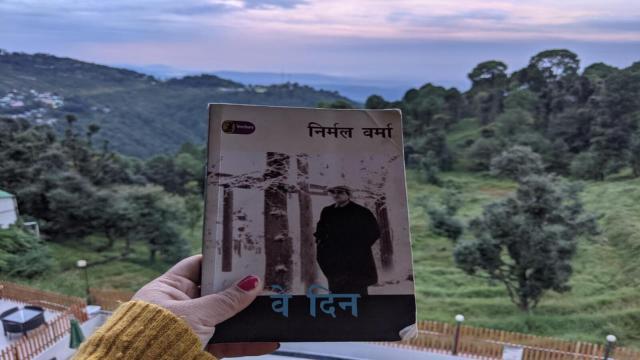
Is love real if it only lasts for a few days, or is longevity, no matter how insipid or draining the relationship, more important?
A Hindi novel published 60 years ago prods you to face this question. Driven by my keenness to read Hindi literature beyond Prem Chand, I bought Ve Din (Those Days) by Nirmal Verma in 2021 and was immediately hooked. I wrote a note on the blank pages of the book: “I feel like this book is filling the emptiness inside me. On other days, I have to really extricate myself from the phone in order to concentrate on a book. But this time, there is nothing that I want to do more than to be with this book.”
According to a friend, this was bound to happen. She calls it “Nirmal Verma ka sammohan” — “the magical hypnosis of Nirmal Verma”. Three years on, I can confirm that I am yet to emerge out of it.
Ve Din has two central characters: The narrator and Raina Ramon — a woman from a different country, age bracket and social standing who comes into his life for only three days. These turn out to be the best three days of his life.
The narrator is a young man living in Prague, Czech Republic (then Czechoslovakia), where he has been invited on a fellowship. To earn an extra buck, he offers his services as an interpreter to a tourist agency. One day, he is informed that he has to accompany a tourist from Austria. The tourist is Raina, a single mother visiting with her son Mita.
From the beginning, we know that this love story is “doomed”. Thankfully, the narrator and Raina are not slaves to our restricted definition and let things just happen to them. “Sirf hone ka sukh (the happiness of just being)”, as the narrator says in the book.
They go around the city: Raina trying to recall memories of a previous visit, while unknowingly making new ones with this rank stranger, sight-seeing, pub crawling, pouring their hearts out to each other. To an outsider, they looked like a regular couple. Except they are not.
They hold hands, kiss and make love, organically and intensely, but there is no expectation, no judgement. They are not bringing up each other’s past or making promises for the future. They are living in the moment, soaking in perhaps the most beautiful thing that has happened to either in a long time.
How often do we ruin a perfectly good moment because we ask, “what about the future?” Through Raina and the narrator’s unlikely love story, Ve Din nudges us to remember that we can still immerse ourselves in something, just because it feels right at the moment; because it is introducing us to a part of us we were yet to meet. And that only makes it more worth it.
Ve Din tells us that human emotions are much more than the words and labels we want to box them in. “One-night stand”, “situationship”, “fling”: Thank God the protagonists of this story were not born in our times! The modern-day vocabulary of love would have dismissed them in a jiffy.
This book inspires you to take a chance, even if you know the consequences will be far from what society considers ideal. It tells you that sometimes, when you come across something rare or unique, your only option might be to go all in.
The love story of author Amrita Pritam and her life-long partner, the artist Imroz, is one of my favourites — two people, together for decades, without the trappings of a formal relationship or labels. This book made me stop and think: “You can also have this kind of love, which tangibly lasts for only three days, but is as real as a life-long partnership.”
Towards the end, Raina, a strong, independent woman, far more practical and rational than her young, romantic lover, asks him. “Suno, jo humein mila, wo kaafi nahi hai? (Is it not enough, what we have received in these few days?)”
This is a question that we must all ask ourselves.
deepika.singh@expressindia.com